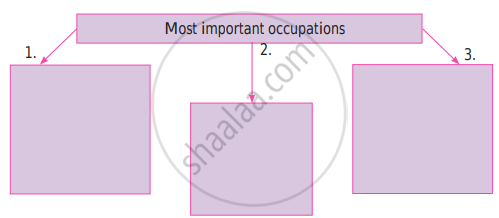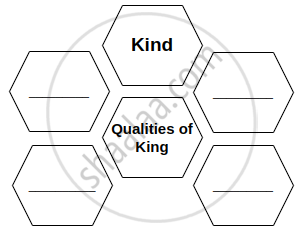Advertisements
Advertisements
प्रश्न
Answer the following question.
The hermit ‘spoke only to common people’; so the king ‘put on simple clothes’. Do you think the king hoped to be mistaken for a common man or was he just showing that he was a humble person? What shows that the hermit knew him to be the king?
उत्तर
The king put on simple clothes because he did not want the hermit to refuse to answer his questions. The king was aware that the hermit was wise and would know that he was the king and not mistake him for a common person. Out of humility and respect, the king dressed up as a commoner. We know that the hermit knew that he was the king, by the way, he returned the king's greeting.
APPEARS IN
संबंधित प्रश्न
Expressions in English classified under different heads. Pair up with your partner, guess, and match the columns. (Use a dictionary.)
| A | B | |
| (1) Principle | (a) | a generally accepted, evident, truth |
| (2) Quotation | (b) | short striking messages for the public |
| (3) Moral | (c) | a short witty remark stating the truth |
| (4) Idioms | (d) | a popular, well-known truth |
| (5) Slogans | (e) | established expressions which do not convey exactly the same as individual words |
| (6) One-liners | (f) | words cited from a speech/text of a famous person |
| (7) Maxims | (g) | a lesson derived from a story or experience |
| (8) Proverb | (h) | a rule to govern one’s behaviour |
Read the polite request/suggestion and complete the gaps in the responses. Make sure they are polite and not repeated.
| Can you please pass the salad? | Accept (1) ________ Accept (2) ________ |
Read the polite request/suggestion and complete the gaps in the responses. Make sure they are polite and not repeated.
| Do you need help? | Accept (1) ___________ Refuse (2) ___________ |
Let’s see if you remember a nursery rhyme you must have sung, as a kid :
|
Fill in the missing words : ‘The time to be happy is ___________________ The ___________________ to be happy is here. And the way to be __________________ is to _________________ someone happy And have a little _______________ right here !’ |
Read the story and answer whether the following statement is true or false.
The people convinced the King to make a proclamation.
Match the titles with the contents of the proper paragraph.
| 1. | Once a certain king . . . important to do. | a | King gains a friend. |
| 2. | Many learned people . . . time for everything. | b | The wounded stranger. |
| 3. | Equally varied . . . gave the reward to none. | c | King helps the hermit. |
| 4. | When the King arrived, . . . my first attention. | d | The stranger begs for pardon. |
| 5. | The hermit listened . . . continued to dig. | e | The hermit points out answers. |
| 6. | The King turned round . . . gave it to him. | f | Stranger’s vicious intention. |
| 7. | Meanwhile the sun . . . said the King. | g | Questions remain unanswered. |
| 8. | “You do not know . . . all my life. | h | The king received various answers. |
| 9. | The King was very glad . . . the day before. | i | King’s announcement. |
| 10. | “Do you not see?” . . . sent into this life!” | j | The King meets the hermit. |
Complete the Tree diagram associated with the happenings in the story.

Answer the following question.
The learned people were sometimes divided in their opinions, different persons giving quite different answers; at other times, none of them gave an answer. They all suggested ways to look for an answer. Point out one example of each.
From the story, find the collocation of the following.
____________ time.
Read the following passage and do the activities.
B1. State whether the following statements are True or False in context to the passage.
- The king helped his friend who was wounded.
- The weather was hot and humid.
|
Meanwhile, the sun had set and it had become cool. So the king, with the hermit's help, carried the wounded man into the hut. The man lay there quietly with his eyes closed. By now, the king was so tired after his walk and the work he had done, that he laid down himself and soon fell asleep. When he awoke in the morning, it took him some time to remember where he was and who was the strange bearded man lying by his side and gazing intently at him. "Forgive me!" said the bearded man in a weak voice, when he saw that the king was awake and was looking at him. "I do not know you, and I've nothing to forgive you for", said the king. "You do not know me, but I know you. I am that enemy of yours who swore to revenge himself on you because you executed his brother and seized his property. I knew you had gone alone to see the hermit, and I resolved to kill you on your way back. But the day passed and you did not return. So I came out of my ambush to find you. Your bodyguards recognized me and wounded me. I escaped from them but would have bled to death had you not dressed my wound. I wished to kill you but you have saved my life. Now it I live, and if you wish it, I'll serve you all my life." The king was very glad to have made peace with an enemy so easily and to have gained him for a friend. He not only forgave him but also said that he would send his men and his own physician to attend to him. The king then took leave of him and went out of the hut to look for the hermit. |
B2. Complete the word web in context with the king's qualities as understood from the passage.

B3. Find out the words from the passage which mean:
- Showing great attention to something.
- Kill someone as a legal punishment.
- To hide and wait for someone in order to attack them.
B4. Convert the words as directed.
- Write the noun form of 'quietly'.
- Write the adjective form of 'forgive'.
B5. Do you think the hermit knew, beforehand, not only about the king's arrival but also about the attack by his enemy?
